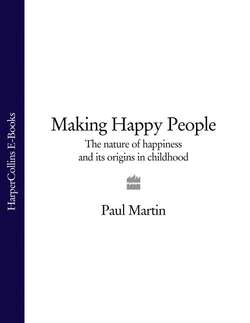Читать книгу Making Happy People: The nature of happiness and its origins in childhood - Paul Martin - Страница 20
1. Connectedness
ОглавлениеProbably the single most important and consistent characteristic of happy people is that they are connected to other people by personal relationships. Happy children typically have secure and loving relationships with their parents, get on well with other children, and have one or more good friends. For their part, happy adults typically have one or more close relationships with a partner, relatives or friends, plus a range of shallower relationships with friends, acquaintances and colleagues.
One of the main themes of this book is that personal relationships are central to happiness; we shall be exploring this further in the next chapter. The support, confidence and emotional security that come from close personal relationships form the bedrock of happiness, especially for children. And when it comes to relationships, quality is more important than quantity. One close relationship with a partner, parent or friend may be sufficient to sustain happiness, in a way that hundreds of casual acquaintanceships rarely achieve.
To have any relationships at all, of course, a person must have some basic willingness and ability to interact with other people. The more someone is naturally drawn to the company of others, the more relationships they are likely to have and the greater their scope to form close relationships. That is one reason why socialites tend to be happier than recluses. The philosopher Bertrand Russell hit the nail on the head when he wrote that to like many people spontaneously and without effort is perhaps the greatest of all sources of personal happiness. Over the years, research has consistently found that sociable people are, on average, happier than those who find company difficult or unattractive. For example, a long-term study of everyone born in the UK in one particular week in March 1958 found that those who were more sociable during their teens were significantly happier when assessed again in their mid-thirties.
Much of the psychological research in this area has focused on a personality characteristic known as extroversion, which is essentially an indirect measure of sociability. Extroverts are friendly, outgoing, sociable, warm and active. They have a natural tendency to enjoy social situations and social activities such as parties, games and team sports.1 Numerous studies have uncovered links between extroversion and happiness throughout the lifespan, including in old age.
By the same token, shy people – those who consistently feel anxious, self-conscious and reticent in social situations – tend to score low on measures of happiness. Shyness can be a real problem, both for adults and children. On average, shy children are lonelier, have lower self-esteem and suffer from more anxiety than sociable children. Very shy adults are found to be unhappier even than people suffering from anxiety or mood disorders. Not all shy people are unhappy, however. A significant minority of ‘happy introverts’ are happy despite not being gregarious.
Sociability and happiness form a virtuous circle: sociable people become happier because they are more connected, and happiness, in turn, makes us more sociable, as we saw in the previous chapter. Happy people spend more of their time engaging with other people and have a larger number of social interactions.
